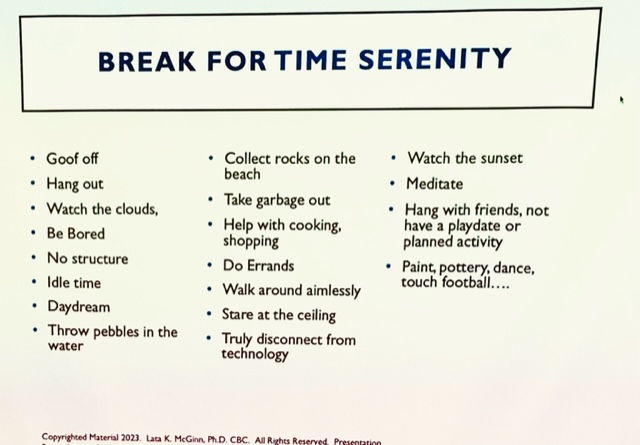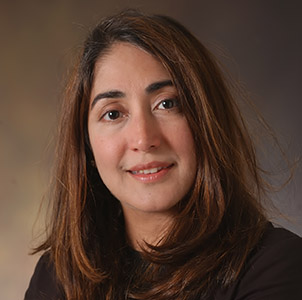McGinn Examines Why Busyness Does Not Lead to Happiness
- Wednesday, 11 January 2023 21:41
- Last Updated: Thursday, 12 January 2023 09:02
- Published: Wednesday, 11 January 2023 21:41
- Wendy MacMillan
- Hits: 2687
 Is your child stressed out, cranky, or full of anxiety? According to Dr. Lata K. McGinn, these may be signs that your child is overscheduled. As parents we want the very best for our children and try to give them every opportunity for a successful, fulfilling life. In a presentation sponsored by the Scarsdale Parent Teacher Council and CHILD, Dr. McGinn explored the negative impact scheduling too many structured activities, lessons, sports, tutors, etc. can have on our children and their mental health.
Is your child stressed out, cranky, or full of anxiety? According to Dr. Lata K. McGinn, these may be signs that your child is overscheduled. As parents we want the very best for our children and try to give them every opportunity for a successful, fulfilling life. In a presentation sponsored by the Scarsdale Parent Teacher Council and CHILD, Dr. McGinn explored the negative impact scheduling too many structured activities, lessons, sports, tutors, etc. can have on our children and their mental health.
In the first part of her presentation Dr. McGinn, a clinical psychologist and co-founder of Cognitive and Behavioral Consultants (CBC), acknowledged that the overscheduled child is not entirely the fault of well-meaning parents and explored some of the ways in which our modern U.S. society contributes to the pressure to perpetually achieve. She began by dubbing “America the Beautiful” as “America the Busy” and highlighted that although Americans work longer than most other advanced economies, America is not the most productive. Instead, Norway is the most productive economy per hour, where work is capped at 37.5 hours per week. McGinn illustrated this difference to point out that working longer hours doesn’t equal more productivity…just as piling on more activities to growing children doesn’t make them more competitive.
So why do Americans, whom many are reportedly “too busy to sleep or date,” keep working as much as they do? According to McGinn it is partially due to our financial achievement-oriented society where we are caught in a “work and spend '' spin cycle. She also pointed out that not only are costs ballooning but there is greater pressure to put your life on social media and to keep up with what we might see on Instagram. Additionally, in the U.S, being busy makes people in our culture feel important, people share their busyness as a status symbol, and feel guilty about having leisure time…all of which upholds the sense of importance we have created in our society to keep our schedules filled to the brim. As McGinn shared in one of her slides, studies show Americans feel like they are working harder than ever, have less time, and live more frenetic lives where even leisure time is splintered to attend to multiple tasks at once.

In contrast, places like Denmark are not only more productive, but also place great value on Hygge which the Oxford Dictionary defines as “a quality of coziness and comfortable conviviality that engenders a feeling of contentment or well-being (regarded as a defining characteristic of Danish culture).” The Hygge culture includes an emphasis on time spent with family, friends, and time alone in addition to value given to leisure time, fun, and simplicity. As a result, the United Nations ranks Denmark as #1 in their World Happiness Report while the U.S. sits at #11. Of course Denmark is far from perfect and there are many other factors that contribute to their sense of well-being…McGinn highlighted their Hygge culture in hopes that we can learn from them and improve our own cultural ideologies.
Dr. McGinn went on to discuss how cultural pressure in the U.S. is affecting our society. She pointed out that according to the World Health Organization, “Americans live in the richest country but are the most anxious.” Also, according to Child Development, “the average high school student experiences the same level of anxiety as the average psychiatric patient in the 1950’s.” These statistics date back to before the Covid Pandemic and since then, McGinn warns that our children have experienced a mental health tsunami. Of course a busier, overscheduled life isn’t solely responsible for the mental health crisis children are experiencing, McGinn includes these other factors as well:
-Actual persistent threat and disruptions in addition to perceived dangers. McGinn discussed how there is so much going on in the world and we all have such quick easy access to the news. We read about something terrible happening halfway across the world and it makes us feel anxious. She also explained that our brains aren’t equipped to deal with the persistent tension we feel from the threat of things like school shootings.
-Living with less social support than previous generations.
-Intense rising pressures.
-Socio-cultural changes.
-Digital Age/Social Media. McGinn suggests watching the video “Like” which explores the impact of social media on our lives.
-Increased scaffolding which McGinn described as parents doing too much for their children because their children are so busy with their structured schedules. Children today aren’t doing chores or running errands like they did before and are thus missing out on learning important life skills.
Moving on, McGinn outlined the impact of over-enrichment. She first recognized that enrichment and the enriching activities we sign our kids up for like ballet, soccer, chess, music lessons, debate, acting, and so much more are healthy and important when it helps an individual to thrive. The impact of over enrichment however, is burnout and burnout is the opposite of thriving. Furthermore, as McGinn explained, burnout leads to a lack of motivation and poor performance. Other detrimental effects of over-enrichment include:
-The creation of unrelenting standards where people are expected to be on a journey for some sort of mastery.
-An inability to tolerate boredom. Because they have no time to be bored, children today don’t know how to deal with boredom and quickly turn to their devices for comfort. They don’t give themselves any time to daydream, think, or reflect and this all impacts their sense of curiosity and creativity.
-Negative impacts on autonomy, self-direction, and sense of self. When parents schedule activities for their children or force children to stick with something they don’t want to, it doesn’t allow space for a child to explore their own interests and hobbies.
-Can increase mental health issues such as anxiety which is a gateway disorder.
While these detrimental effects of overscheduling can be worrisome, McGinn reminds us that parents, schools, colleges, and employers are in this together and can all be a part of the solution. She encouraged her audience to make little changes to their own children’s lives and that collectively we can create an ocean of change.
McGinn proposed to start by increasing awareness of the busyness we create in our own lives and what we model for our children. She also spoke of the “Selfie Syndrome” and how management of technology is one of the most important changes we can make as parents. She described The Selfie Syndrome as a condition that is all about self-promotion, personal, branding, and self-interest at the exclusion of others feelings, needs, and concerns. She went on to describe four reasons that we should be concerned:
-We see a measurable dip in empathy among today’s youth and a significant increase in narcissism
-We observe a clear increase in peer cruelty
-We observe more cheating and weaker moral reasoning in young people
-Our plugged-in. high-pressure culture is leading to a mental health epidemic among young people
In other slides, McGinn illustrated how since the invention of the smartphone there has been a marked decline in how much time children spend hanging out with their friends, a huge jump in feelings of loneliness, a sharp increase in teens not getting enough sleep, and a decrease in the percentage of teenagers who go out on dates.
To help combat the overuse of smartphones, McGinn suggests:
-Be balanced and open-minded in your family discussions on this topic.
-No screens at the table during meal times.
-Model appropriate digital etiquette to your kids.
-Keep all screens out of the bedroom at night to reduce temptation.
-Turn off notifications so you can check when YOU are ready and have time.
-Convert iPhone colors to black and white…less color is less enticing.
In the quest to reduce the number of activities in our children’s schedules, Dr. McGinn suggests we make “Approach Decisions” vs, “Fear Based Decisions” about their after-school activities. Some questions you might ask are:
-Will they enjoy it?
-Will they gain mastery?
-Are they getting enough time to play/take a break?
Dr. McGinn also encouraged us all to “work smarter, not more” and to move away from busyness and towards serenity as a value. She further encouraged her audience to be in the present moment and to identify sources of burnout, to cultivate breaks/leisure/hobbies for pleasure, and to simplify our lives. To conclude, McGinn stressed that it is all about balance and that our plates should be full of equal parts activities for pleasure and activities for mastery, structure and no structure, enrichment and relaxation.
At the conclusion of her presentation, Dr. McGinn answered questions from the audience. One mother spoke about how it would be easier to choose less for our children if it were driven from “upstream.” She then asked if Dr. McGinn felt like colleges and universities are discussing the impact of overscheduling and if she felt they are open to making changes. Dr. McGinn answered that colleges and universities are being overwhelmed by the amount of students who are dealing with mental health issues including anxiety and depression and are thus, forced to take the issue very seriously. She believes that most are already taking actions to make much needed changes.
 A recording of this PTC/CHILD program will soon be available on the District’s website.
A recording of this PTC/CHILD program will soon be available on the District’s website.
Lata K. McGinn, PhD is a clinical psychologist and is a tenured Professor of Psychology and Director of the CBT training program at the Ferkauf Graduate School of Psychology, Yeshiva University. She is co-founder of Cognitive and Behavioral Consultants (CBC), an evidence-based treatment and training center in New York. She specializes in cognitive-behavioral treatment of anxiety, depression and related disorders. Aside from having multiple published articles, books and extensive presentations she has been highlighted by various media outlets including NBC, Huffington Post, USA Today, Elite Daily, Parents, Shape, Bustle and others. See her full bio here.






